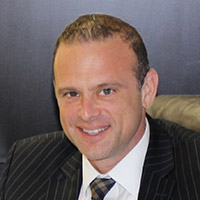Less Volatility Equals Greater Reliability in Retirement Portfolio
Chasing high market returns is always a risky proposition, and if you're approaching retirement, it could be a losing one as well.

Profit and prosper with the best of Kiplinger's advice on investing, taxes, retirement, personal finance and much more. Delivered daily. Enter your email in the box and click Sign Me Up.
You are now subscribed
Your newsletter sign-up was successful
Want to add more newsletters?

Delivered daily
Kiplinger Today
Profit and prosper with the best of Kiplinger's advice on investing, taxes, retirement, personal finance and much more delivered daily. Smart money moves start here.

Sent five days a week
Kiplinger A Step Ahead
Get practical help to make better financial decisions in your everyday life, from spending to savings on top deals.

Delivered daily
Kiplinger Closing Bell
Get today's biggest financial and investing headlines delivered to your inbox every day the U.S. stock market is open.

Sent twice a week
Kiplinger Adviser Intel
Financial pros across the country share best practices and fresh tactics to preserve and grow your wealth.

Delivered weekly
Kiplinger Tax Tips
Trim your federal and state tax bills with practical tax-planning and tax-cutting strategies.

Sent twice a week
Kiplinger Retirement Tips
Your twice-a-week guide to planning and enjoying a financially secure and richly rewarding retirement

Sent bimonthly.
Kiplinger Adviser Angle
Insights for advisers, wealth managers and other financial professionals.

Sent twice a week
Kiplinger Investing Weekly
Your twice-a-week roundup of promising stocks, funds, companies and industries you should consider, ones you should avoid, and why.

Sent weekly for six weeks
Kiplinger Invest for Retirement
Your step-by-step six-part series on how to invest for retirement, from devising a successful strategy to exactly which investments to choose.
The typical stock investor tends to pay far more attention to how much money can be made in the market than how much potentially could be lost.
That makes sense. If you weren’t optimistic about growing those investments, why would you take the risk?
But if you’re going into the market assuming your returns will be the same or better than the S&P 500 every year, you’re likely to be disappointed.
From just $107.88 $24.99 for Kiplinger Personal Finance
Become a smarter, better informed investor. Subscribe from just $107.88 $24.99, plus get up to 4 Special Issues

Sign up for Kiplinger’s Free Newsletters
Profit and prosper with the best of expert advice on investing, taxes, retirement, personal finance and more - straight to your e-mail.
Profit and prosper with the best of expert advice - straight to your e-mail.
Wall Street firms and business media pundits like to pound out the message that investing in the stock market is the only way to go if you want to build real wealth. But the earnings they tout don’t necessarily apply to average investors, who have to pay fees, trading costs and other expenses on their investments.
Unless you’re the type of investor who likes digging through a prospectus, those costs can be easy to miss. If you invest in a mutual fund with a 1% expense ratio, for example, you’ll pay $100 per year for every $10,000 invested. That might not seem like much, but over the years, it can really eat away at your returns. Moreover, actively managed mutual funds tend to have on average 1.44% per year in unpublished trading costs.
Then there’s your silent partner, Uncle Sam, who will want to be sure to get his share in taxes. (You can pay him now or later.)
And, of course, some investors can be their own worst enemy.
According to the research firm DALBAR’s latest Quantitative Analysis of Investor Behavior (QAIB), investors lost 9.42% over the course of 2018, compared with a 4.38% loss by the S&P. And that isn’t all that unusual. Over the 30-year period, from 1997 to the end of 2016, while the S&P 500’s average annual return was 10.16%, the average mutual fund equity investor’s return was 3.98%.
Much of that difference, DALBAR says, can be blamed on chasing performance and bad decisions based on emotions.
The fear of loss leads many investors to sell at the worst possible time and move their money to cash and other investments. Then, when the stock market is up again, they get back in — following the crowd and acting too late to take advantage of low prices that could have given their portfolio a boost.
And the cycle repeats.
Why It’s Time to Be Vigilant
We’ve just gone through a great decade with the stock market. But there’s no predicting what will happen next — and we can’t be sure the next decade will be as strong for stocks. If you look at the history of annualized returns for U.S. stocks, some of the best decades have been followed by some of the worst. The 1920s were followed by the Great Depression of the 1930s. The prosperous ’50s were followed by the sluggish ’60s. And the worst decade on record, the 2000s, was bookended by the ’90s and 2010s — two decades that had very strong growth.
For those in or near retirement, the possibility of a bear market means extra vigilance is in order.
Market fluctuations are a distraction when you’re young or even middle-aged and still building your retirement savings. But with time and continuing contributions, investors usually can make back their money after a correction or downturn — and perhaps even benefit from a drop in prices.
If you’re drawing income from your retirement accounts instead of contributing to them when a downturn occurs, however, it can devastate your portfolio and your plans. You are essentially reverse dollar cost averaging. Your investments won’t recover as quickly — if ever — and you could run out of money much sooner than you thought.
Take Some Steps Toward Safety
The less risk in or near retirement, the better. That means shifting to investments that can protect your principal and provide reliable income. If you keep money in the stock market — which is likely as most investors require some protection against inflation — it’s essential to also have funds you can access without having to sell those stocks at a low.
It’s also important to be proactive about the “hidden” costs of the equity funds in your portfolio. Talk to your financial professional about tax minimization strategies. Choose funds with lower fees and expenses. Try to keep your emotions in check to avoid selling when the market is down.
And always evaluate investments for expected volatility as well as the expected return.
A degree of caution is always a good thing when it comes to investing — but it becomes crucial when you’re ready to retire. Those who plan ahead will be in a better position to reach their goals and maintain their lifestyle no matter what happens to the market in the future.
Kim Franke-Folstad contributed to this article.
Investment advisory services offered through Singer Wealth Advisors Inc., a registered investment advisory firm in the State of Florida.
All investments are subject to risk including the potential loss of principal. No investment strategy can guarantee a profit or protect against loss in periods of declining values.
This content is designed to provide general information on the subjects covered. It is not intended to provide specific investment advice and should not be construed as advice designed to meet the particular needs of an individual’s situation.
Profit and prosper with the best of Kiplinger's advice on investing, taxes, retirement, personal finance and much more. Delivered daily. Enter your email in the box and click Sign Me Up.

Keith Singer, owner and president of Singer Wealth Advisors, is a CERTIFIED FINANCIAL PLANNER™. His firm is an SEC-registered investment advisory firm. Mr. Singer is also a licensed Florida attorney. He is the host of the radio show Prosper! With Keith Singer, which currently airs on five stations in South Florida.
-
 Dow Adds 1,206 Points to Top 50,000: Stock Market Today
Dow Adds 1,206 Points to Top 50,000: Stock Market TodayThe S&P 500 and Nasdaq also had strong finishes to a volatile week, with beaten-down tech stocks outperforming.
-
 Ask the Tax Editor: Federal Income Tax Deductions
Ask the Tax Editor: Federal Income Tax DeductionsAsk the Editor In this week's Ask the Editor Q&A, Joy Taylor answers questions on federal income tax deductions
-
 States With No-Fault Car Insurance Laws (and How No-Fault Car Insurance Works)
States With No-Fault Car Insurance Laws (and How No-Fault Car Insurance Works)A breakdown of the confusing rules around no-fault car insurance in every state where it exists.
-
 For the 2% Club, the Guardrails Approach and the 4% Rule Do Not Work: Here's What Works Instead
For the 2% Club, the Guardrails Approach and the 4% Rule Do Not Work: Here's What Works InsteadFor retirees with a pension, traditional withdrawal rules could be too restrictive. You need a tailored income plan that is much more flexible and realistic.
-
 Retiring Next Year? Now Is the Time to Start Designing What Your Retirement Will Look Like
Retiring Next Year? Now Is the Time to Start Designing What Your Retirement Will Look LikeThis is when you should be shifting your focus from growing your portfolio to designing an income and tax strategy that aligns your resources with your purpose.
-
 I'm a Financial Planner: This Layered Approach for Your Retirement Money Can Help Lower Your Stress
I'm a Financial Planner: This Layered Approach for Your Retirement Money Can Help Lower Your StressTo be confident about retirement, consider building a safety net by dividing assets into distinct layers and establishing a regular review process. Here's how.
-
 The 4 Estate Planning Documents Every High-Net-Worth Family Needs (Not Just a Will)
The 4 Estate Planning Documents Every High-Net-Worth Family Needs (Not Just a Will)The key to successful estate planning for HNW families isn't just drafting these four documents, but ensuring they're current and immediately accessible.
-
 Love and Legacy: What Couples Rarely Talk About (But Should)
Love and Legacy: What Couples Rarely Talk About (But Should)Couples who talk openly about finances, including estate planning, are more likely to head into retirement joyfully. How can you get the conversation going?
-
 How to Add a Pet Trust to Your Estate Plan: Don't Leave Your Best Friend to Chance
How to Add a Pet Trust to Your Estate Plan: Don't Leave Your Best Friend to ChanceAdding a pet trust to your estate plan can ensure your pets are properly looked after when you're no longer able to care for them. This is how to go about it.
-
 Want to Avoid Leaving Chaos in Your Wake? Don't Leave Behind an Outdated Estate Plan
Want to Avoid Leaving Chaos in Your Wake? Don't Leave Behind an Outdated Estate PlanAn outdated or incomplete estate plan could cause confusion for those handling your affairs at a difficult time. This guide highlights what to update and when.
-
 I'm a Financial Adviser: This Is Why I Became an Advocate for Fee-Only Financial Advice
I'm a Financial Adviser: This Is Why I Became an Advocate for Fee-Only Financial AdviceCan financial advisers who earn commissions on product sales give clients the best advice? For one professional, changing track was the clear choice.